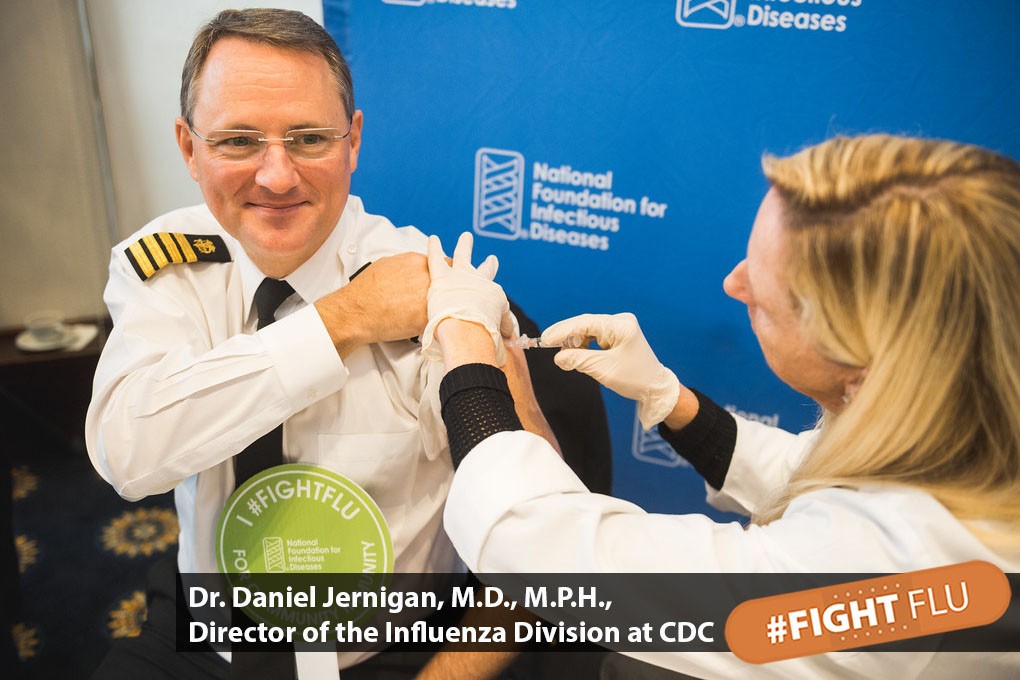 Daniel B. Jernigan, MD, MPH
Daniel B. Jernigan, MD, MPH
Director of the Influenza Division
National Center for Immunization and Respiratory Diseases
Centers for Disease Control and Prevention
For millions of people, the flu can mean a fever, cough, sore throat, body aches, and fatigue for a week or more. But did you know that if you are 65 years or older, you are at increased risk of serious flu-related complications, like pneumonia?
“People’s immune systems can become weaker with age, which places older adults at high risk of serious flu-related complications,” says Dr. Lisa Grohskopf, a medical officer with CDC’s Influenza Division.
While flu seasons vary in severity, people 65 years and older bear a comparatively greater burden of serious flu-related illness compared to other age groups during most flu seasons. Data from recent seasons shows that between about 70 to 90 percent of seasonal flu-related deaths in the United States have occurred among people 65 years and older. For hospitalizations, this number is between about 50 and 70 percent.
This is why flu vaccination is especially important for people 65 years and older. While flu vaccine can vary in how well it works, there are a lot of scientific data showing that flu vaccination prevents illness and hospitalizations, even among people 65 and older for whom the vaccine may not work as well. A new CDC study published this summer in the journal Clinical Infectious Diseases (CID) found that flu vaccination reduced the risk of flu-related hospitalization among people 65 to 74 years by 61%. Vaccinated people 75 and older were similarly protected (57%).
During 2015-2016, an estimated 66% of people 65 and older got a flu vaccine. While this is among the highest vaccination rates for any age group, that still leaves about 11 million people 65 and older unvaccinated. Recent analyses at CDC have found that if vaccinations among people in this age group increased by 5%, an additional 35,000 illnesses and about 3,200 hospitalizations would be prevented.
CDC estimates that last season’s flu vaccines reduced the risk of having to go to the doctor for flu illness by 45% among people 65 and older. There are four types of flu vaccines approved for use in people 65 and older: some standard dose flu shots (including inactivated and recombinant shots), a “high dose” flu shot (Fluzone® High-Dose) and an adjuvanted flu vaccine (Fluad™). The latter two vaccines are approved only for use in people 65 and older and both are designed to promote a stronger immune response in the person being vaccinated. However, CDC has not expressed a preference for any one injectable flu vaccine over another. “The important thing is to get vaccinated,” says Grohskopf.
Flu vaccines are offered in many locations, including doctor’s offices, clinics, health departments, and pharmacies. Most health insurance plans cover the cost of recommended vaccines. Flu vaccination is a benefit of Medicare. If you don’t currently have health insurance, visit www.HealthCare.gov to learn more about affordable health coverage options. Get vaccinated and encourage your friends and family to do the same. When more people get vaccinated against the flu, less flu can spread through the community.
In addition to getting a flu shot, it’s important to practice healthy habits, such as covering coughs, washing hands often, and avoiding people who are sick. If you are 65 and older and develop flu symptoms, seek medical advice quickly. CDC recommends rapid treatment with an influenza antiviral medication. Antiviral drugs are prescription medications (such as pills, liquid, an inhaled powder, or an intravenous solution) that fight against the flu in your body.
Antiviral drugs work best when used early, ideally within 48 hours of getting sick. For people at high risk of serious flu complications, treatment with an antiviral drug can mean the difference between having milder illness instead of very serious illness that could result in a hospital stay.
For more information about influenza, flu vaccine or antiviral medications, talk to your doctor or other health care provider, visit http://www.cdc.gov/flu, or call CDC at 1-800-CDC-INFO (800-232-4636).
